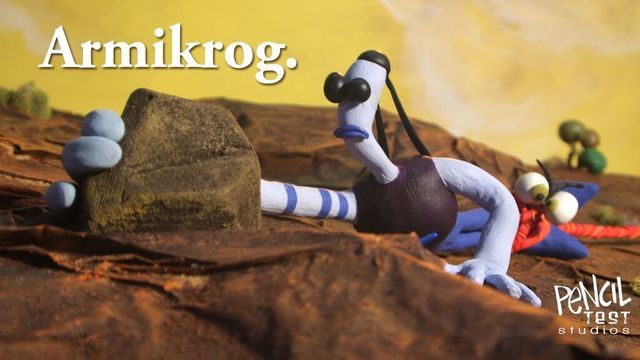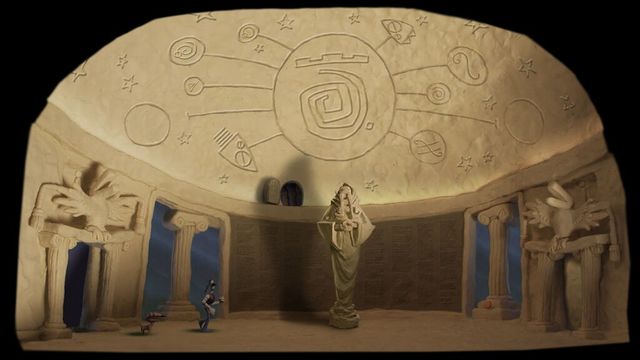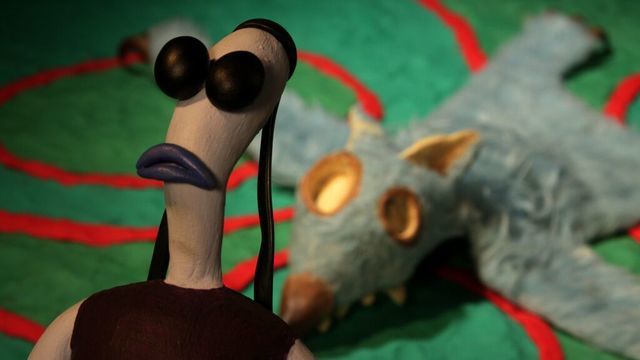You play as an astronaut who gets stranded on an alien planet and must use his wits to survive and find his way home. No, this is not The Martian, and you aren’t Matt Damon. No, this is Armikrog, and you are Tommynaut.
Armikrog is a point and click adventure/puzzle game that is very much inspired by classic point and click games, especially when you consider the talent involved made just such a game (they also made Earthworm Jim). This is a double-edged sword, however, on one hand it’s great to see the resurgence of the genre and the copious amounts of humor and charm it brings, but it also reminds you how frustratingly difficult the genre can be. Armikrog is guilty in both areas.
Stylin’ and profilin’
I want to start with the obvious: Armikrog is incredible looking. The game was made using hand-animated claymation, similar to movies like The Nightmare Before Christmas, Paranorman, Coraline, etc. And this painstaking technique pays dividends; right from the beginning, in which Tommynaut crash lands on this dangerous planet, you are bombarded with the wonderful art style and the charm it oozes.
Meet Tommynaut…..and a hungry-looking chap
The production value never dips throughout the 2-3 hour experience. The game was launched then quickly pulled and delayed a week to fix a few game-breaking bugs, and the delay was a wise one. I didn’t encounter a single glitch, frame rate dip or anything less than top-quality animation.
There isn’t a limit on the praise to be thrown at Armikrog for its clay animation. This gives the game a distinct edge that sets it apart from every other game of its kind, truly few games look quite this eye-catching and impressive.
But it’s not all about the looks, Amrikrog makes excellent use of sound too. The in-game sounds are well done, especially the lack of sound to convey vast spaces, and the voice-acting is superb. Tommynaut is voiced by Michael J. Nelson of Mystery Science Theater 3000 and Beak-Beak is voiced by Rob Paulson, who provided voices for some classic cartoons like Animaniacs and Dexter’s Laboratory. While they don’t speak all that often, only in cutscenes, Tommy and Beak-Beak have a great rapport and provide comedic relief that suits the game’s style. It’s just a shame they don’t speak during the lengthy gameplay sections.
Clever plot, or plotless?
The story in Armikrog is a rather odd one. The jury is still out on whether it actually works in the end or not. Tommynaut is out with his faithful mutt, Beak-Beak, looking for a precious resource to save his dying planet. As mentioned previously, they crash land on a dangerous planet and are immediately attacked by a hairy beast with a big ol’ tongue. They escape the creature by entering a fortress known as Armikrog.
It’s here where the game begins. You start in a locked room, as many a puzzle game does, and you simply start clicking around to move and figure out what can be interacted with. Eventually, you’ll start exploring the fortress and learning more about its history and the planet. The only problem is the way in which you are told the story, by purple Octopi, or Claypusses, is told in complete Sim-like gibberish. I don’t consider it a spoiler to tell you that the dialogue is rectified and turned into plain English at the end of the game.
So, if you want to hear the full story, you can expect to back-track through the entire game to hear what the Claypusses have to say. Honestly, this just felt like a really bizarre design choice and means a lot of people who finish the game will do so without ever hearing the full story. Seems like English-speaking Claypusses should have been there from the get-go.
Meet The Claypuss
But let’s take a step back. Tommynaut and Beak-Beak traverse Armikrog and discover all of the oddities that dwell within. In the first third of the game, you discover a baby. Tommy picks up the seemingly abandoned child and tucks it into his shirt. On two random occasions the baby will begin crying and you are forced to rearrange its baby-mobile in order to stop it crying. For 90% of Armikrog I forgot the child was even there, never mind important, and yet it turns out to be just that. I won’t spoil anything but rather suddenly and out-of-nowhere a big villain appears and the baby is vital to the plot. It’s an odd twist that would have been better served had it been relevant earlier in the game.
For the vast majority of Armikrog the plot thrust is very simple: escape. Then it adds a much deeper layer and reveals that the literal gibberish you’ve been hearing throughout the game is actually the whole story. It could be considered an interesting and unique way of telling the story but the mere fact that you have to back-track the entire game, which admittedly doesn’t take all that long, kind of kills it.
Had you been learning the story (in English) throughout the game it would have made the later story beats all that more exciting. The story in Armikrog is pretty fun but the way in which it is told leaves a lot to be desired, especially if you don’t go out of your way to hear it.
Point-And-Click-Everything
So what exactly do you do in Armikrog? Well, it’s a fairly straightforward point-and-click adventure game. You move Tommy and Beak-Beak using the cursor, which could have been a unique cursor but it’s just a standard one, and can choose to move just one character at a time, which you will have to do in specific segments. It’s a nice twist being able to control both characters and makes Beak-Beak more than just a cute, albeit gruff, companion.
Oddly enough (for a point-and-click game), there is no indication of what can be interacted with. The frustration of aimlessly clicking everything ends fairly soon as you realize what can and can’t be interacted with. There are a finite number of interactive objects, i.e. buttons, cranks, panels, doors, and levers, and so Armikrog is a fair bit more simplistic than the games that inspired it.
And yet, in spite of that simplicity, you will undoubtedly spend portions of the game just clicking on anything and everything in order to progress. For example, you will find an object, like a fly, and spend an unnecessary amount of time trying to figure out what can be done with it. Eventually, by trial and error, you learn that you should put it in a dog bowl for Beak-Beak to eat. That should be obvious right? I don’t think so.
Armikrog can be difficult. If you’re an old-school point and click adventure fan, then this will probably be right up your alley. It’s not quite as obscure and needlessly challenging as Grim Fandango, but it will frustrate casual fans of the genre. If you want to play it and don’t want the frustration, use a guide; there’s no shame in that!
One other aspect worth pointing out, simply because it’s surprising for an adventure game, is the lack of an inventory. There’s no inventory or pockets that Tommy can look into and see what he has. Rather, you just have to remember what Tommy has on his person and figure out where it goes. Again this isn’t an enormous problem because you never have more than 2-3 items at any one time, and even then the actual items are pretty much always the same.
The way in which you traverse Armikrog is also worth a mention. Your primary mode of transport, besides walking, is using the very long tentacles of the Claypusses. You click on them and Tommy will jump up and grab hold of a tentacle, from here you can usually ascend or descend and discover new areas. It’s a fun way to get around and the animation never tires.
The second mode of transport is an electric rail-car. You eventually provide power to said car and Tommy can move from one location to another via a railing, this is initially very fun and never necessarily gets any less than that. However, it does get tedious. The tedium stems from the rather small levels that the game generates, meaning you end up sailing from screen to screen to screen with a single click and having to sit through (albeit short) load screens each time.
Verdict
Armikrog is very much a classic point-and-click adventure game that hinges on puzzle solving. It’s not a game without its flaws and simply bizarre design choices, especially considering the story, but ultimately its charm, aesthetic, and enjoyability outweigh those factors.
Armikrog is only 2-3 hours long, depending on how long it takes you to solve the puzzles, this is an advantage for the game and makes its issues seem rather trivial. The entire production of Armikrog was created with a lot of love, and it shows. Rarely have I played a more interesting and funny world like that which Pencil Test Studios have created.
The gameplay is very simple, and this is probably for the best because the interface and menus are similarly designed in a simplistic way. The story is interesting if you’re willing to go out of your way to hear it, which is an unfortunate design choice in of itself, and is as fascinating as the completely underutilized villain. You’d be forgiven for thinking that Armikrog was part of a series, and the villain was previously known; Pencil Test Studios introduces and treats him as though you should know.
All in all, I would recommend Armikrog to anyone who enjoys a point-and-click adventure, and anyone who is interested in clay animation. Armikrog is a testament to animation and game design but far from the king of the point-and-click genre.











Published: Oct 4, 2015 05:08 pm